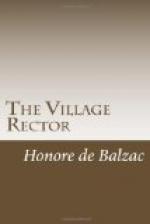“You have laid your finger on the mortal wound of France,” said the juge de paix. “The root of our evils lies in the section relating to inheritance in the Civil Code, in which the equal division of property among heirs is ordained. That’s the pestle that pounds territory into crumbs, individualizes fortunes, and takes from them their needful stability; decomposing ever and never recomposing,—a state of things which must end in the ruin of France. The French Revolution emitted a destructive virus to which the July days have given fresh activity. This vitiating element is the accession of the peasantry to the ownership of land. In the section ‘On Inheritance’ is the principle of the evil, the peasant is the means through which it works. No sooner does that class get a parcel of land into its maw than it begins to subdivide it, till there are scarcely three furrows left in each lot. And even then the peasant does not stop! He divides the three furrows across their length, as Monsieur Grossetete has just shown us at Argenteuil. The unreasonable price which the peasant attaches to the smallest scrap of his land makes it impossible to repurchase and restore a fine estate. Monsieur,” he went on, indicating Grossetete, “has just mentioned the diminution in the raising of horses and cattle; well, the Code has much to do with that. The peasant-proprietor owns cows; he looks to them for his means of living; he sells the calves, he sells his butter; he never dreams of raising cattle, still less of raising horses; but as he cannot raise enough fodder to support his cows through a dry season, he sends them to market when he can feed them no longer. If by some fatal chance the hay were to fail for two years running, you would see a startling change the third year in the price of beef, but especially in that of veal.”
“That may put a stop to ‘patriotic banquets,’” said the doctor, laughing.




